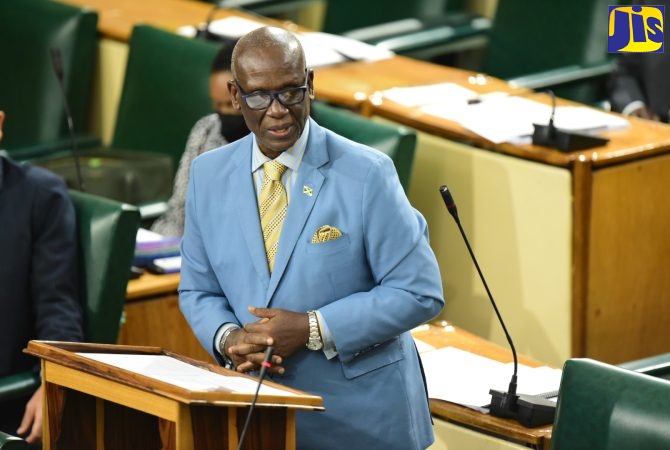Jamaica’s Comprehensive Disaster Risk Management Policy and Strategy, 2020-2040 Green Paper, was tabled in the House of Representatives on Tuesday (July 19), by Minister of Local Government and Rural Development, Hon. Desmond McKenzie.
In his remarks, Mr. McKenzie said the essential purpose of this policy is to ensure that by the year 2040, Jamaica will have strengthened its social and economic resilience, and significantly reduced the negative effects of national disasters caused by natural hazards, man-made disasters, and biological hazards.
“While it would appear that the case for developing this policy is self-evident, it is important to state that a range of factors, including Jamaica’s historical vulnerability to disasters, the pace of our movement towards full disaster resilience, and the need for firmly establishing the financial foundations for disaster risk reduction are among the most prominent,” he stated.
Mr. McKenzie pointed out that Jamaica is highly vulnerable to disasters, noting that approximately 82 per cent of the population and 70 per cent of all major industries, including tourism and agriculture are in coastal areas, which are especially exposed to meteorological hazards.
He further stated that the Global Facility for Disaster Reduction and Recovery has identified Jamaica as the third most exposed country in the world to multiple hazards.
Jamaica’s vulnerability to hurricane risk alone is particularly high, with average annual losses estimated at US$67.3 million, or 0.5 per cent of gross domestic product (GDP).
The Minister noted that the implementation of optimal disaster risk resilience requires substantial financial investments.
“This Policy is one of the performance requirements of the Contingent Loan for Natural Disaster Emergencies that was negotiated between Jamaica and the Inter-American Development Bank in 2018. This facility allows Jamaica to access a maximum of US$285 million to develop a project known as the Comprehensive Natural Disaster Risk Management Programme, to alleviate the impact of severe natural disasters on the country’s finances,” he stated.
Through the Programme, Jamaica’s disaster risk management capacity is being substantially improved through emphasis on five main areas: disaster risk management governance, risk identification, risk reduction, preparedness and response and financial protection.
Mr. McKenzie stated that the Comprehensive Disaster Risk Management Policy reflects the Government’s strategic approach and will guide the integration of disaster risk management into development planning across all sectors and industries.
He informed that this Green Paper includes the management structure for implementing the policy, which will be led by the Ministry of Local Government and Rural Development, and the Office of Disaster Preparedness and Emergency Management (ODPEM).
The Minister said it also includes the mechanisms that will guide policy implementation to 2040, and the associated monitoring and evaluation framework.
Meanwhile, Mr. McKenzie is inviting the public to read the Green Paper, and to comment on its provisions.
It will be available on a range of websites, including that of the Parliament, the Ministry of Local Government and Rural Development and ODPEM.
“There will also be a series of consultations with stakeholders across the island for a limited period, after which the feedback will be assessed and the necessary changes… made,” the Minister said.
He added that the Government looks forward to this process, “which will, no doubt, produce a final policy that will speed up and consolidate Jamaica’s pace of development through effective disaster risk reduction”.
Opposition Spokesperson on Local Government, Natalie Neita Garvey welcomed the tabling of the document, noting that “it was very timely”.








